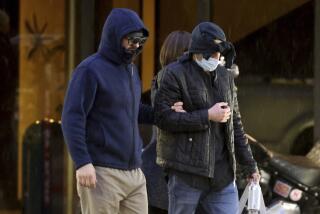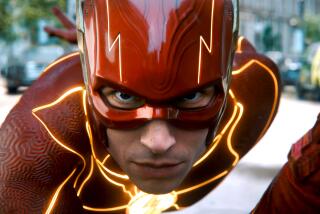Ogorodnikova to Take Stand as Spy Trial Reaches the Showdown Stage
As former FBI Agent Richard W. Miller testified against her in a Los Angeles federal courtroom last week, accused Soviet spy Svetlana Ogorodnikova occasionally smiled and softly laughed, as if the story told by her former lover was too fantastic to be taken seriously.
But Ogorodnikova’s lawyers were in a much more solemn mood as Miller portrayed himself as a bumbling victim and Ogorodnikova as a treacherous foreign agent who had openly recruited him to be a Soviet spy.
After seven weeks of testimony, the spy trial of Ogorodnikova and her husband, Nikolai, has finally approached the showdown stage. To refute Miller’s damaging claims, the defense announced that it now intends to call Ogorodnikova as a witness later in the trial.
Miller faces his own spy trial later this summer on charges that he conspired with the Ogorodnikovs to pass secret FBI documents to the Soviet KGB in exchange for sex and $65,000 in gold and cash.
He testified for four days last week under a court order requiring him to be a witness in exchange for the promise that his words would not be used against him in his own trial. His testimony, expected to continue most of the coming week, resumes today at a critical point--the question of whether Miller passed secret documents to the Soviet Union.
Allegedly Changed Story
According to the FBI, Miller first denied that he actually gave any secret documents to Ogorodnikova. During five days of questioning leading up to his arrest last Oct. 2, however, he allegedly changed his story and admitted passing classified information.
U.S. District Judge David V. Kenyon ruled on June 7, before Miller took the stand, that the government could ask him whether he gave Ogorodnikova any documents. If Miller denies passing secret information, as he is expected to do, the government could then introduce his previous admissions as evidence to challenge his credibility as a witness.
Kenyon’s ruling was a major blow to defense lawyers for both of the Ogorodnikovs, and last week they asked the judge to reconsider his decision.
“That impeachment evidence is the most important, the most damaging piece of evidence in this case,” said Brad D. Brian, one of Ogorodnikova’s two lawyers. “If your honor permits the government to impeach Mr. Miller with that evidence, our client cannot get a fair trial. The prejudicial impact would simply be overwhelming.”
In urging Kenyon to reconsider, Brian pointed out that although Miller is charged with passing secret documents to the Russian couple, the Ogorodnikovs themselves are accused only of conspiring to obtain the documents and are not charged with actually receiving any classified information.
“Our present intention is that our client, Svetlana Ogorodnikova, will testify at this trial, and in her testimony she will deny categorically having received any classified documents from Mr. Miller,” Brian said in his last-ditch effort to persuade Kenyon to reverse himself.
Kenyon, conceding the importance of Miller’s testimony, expressed interest in a proposal by Brian that the government be allowed to ask Miller if he passed documents to Ogorodnikova only if she fails to take the witness stand herself. At that point, the government would have to recall Miller as a witness.
Questioning whether Ogorodnikova will actually testify in her own behalf--a potentially dangerous gamble in view of defense claims that she is emotionally unstable and has an IQ of 74--Assistant U.S. Atty. Bruce G. Merritt urged Kenyon to reject Brian’s proposal.
“Ogorodnikova has asserted the defense that she, as a woman of low intelligence, thought she was working for Miller on behalf of the FBI,” Merritt argued. “Were the jury to believe this, they would certainly not be troubled by the fact that Miller had given Ogorodnikova classified documents.”
Kenyon, declining to make an immediate ruling, said he would make up his mind only when Merritt “can’t proceed further” in his questioning of Miller without asking the former agent if he passed any documents to Ogorodnikova. That time should be reached early in this week’s testimony by Miller.
Miller, frequently contradicting himself and proclaiming his own stupidity, has already testified that Ogorodnikova told him last August that she was a KGB major and that her government would pay “a lot of money” for FBI secrets. He also described a trip with her to San Francisco, after which Ogorodnikova allegedly told him they had been photographed together by Soviet agents, a comment Miller interpreted as sexual blackmail.
While Merritt has not yet confronted Miller with the critical question of whether he passed documents, he already has battered the former agent with questions as to whether he permitted Ogorodnikova to take his FBI credentials with her into the Soviet Consulate in San Francisco last August and suggested that Miller might have copied a list of the home addresses of all FBI agents in Los Angeles for her.
Merritt asked Miller if he recalled asking Ronald Foster, a night supervisor in the FBI’s Westwood office, for such a list last August and being handed the list by Foster.
“If I did, it wasn’t to give to her,” Miller said, adding that he could not remember the incident.
“I’ve got a good forgetter,” Miller continued. “Not intentionally. It’s just part of my makeup. I did not Xerox it, that’s for sure.”
As Miller testified last week about his relationship with Ogorodnikova, her husband, Nikolai, seated behind her at the defense tables in Kenyon’s court, peered curiously at the ex-agent, but showed no emotion other than the vaguely puzzled look that he has had throughout the trial.
Ogorodnikov, 52, is represented by Randy Sue Pollock, a federal public defender, who has portrayed him as an innocent victim of his wife’s intrigues. Although prosecutors concede that Ogorodnikov played a smaller role in the alleged conspiracy than the other defendants, they claim that he was a “utility agent” for the KGB along with his wife.
Pollock has not said if she plans to call Ogorodnikov as a witness in his own defense, but sources close to the trial say he may have to take the stand along with his wife if he wants to convince the jury that he really had nothing to do with the alleged Miller conspiracy.
After Merritt’s questioning of Miller concludes, the defense will begin a lengthy cross-examination that is expected to be equally tough on the former agent, who admitted at one point last week that he was “embarrassed” having to publicly confess a series of misdeeds that included stealing money from his wife’s grandmother.
More to Read
Sign up for Essential California
The most important California stories and recommendations in your inbox every morning.
You may occasionally receive promotional content from the Los Angeles Times.









